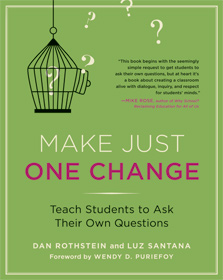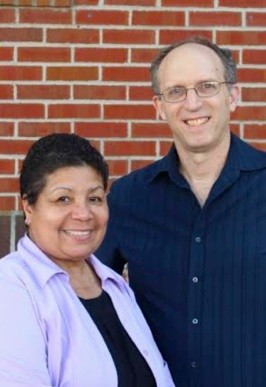Nearly 150 educators – from around the United States and from as far away as Australia, Greece, France, Mexico, Barbados and elsewhere – were in Boston Monday to participate in the Students Are Not Asking Questions working conference.
The conference began with educators addressing important topics related to student engagement, inquiry and question-asking. Working in groups, they participated in a Question Formulation Technique session to brainstorm questions around two provocative statements, both of them quotes:
- “Although we say out loud that asking questions is a great idea, question-asking is not really valued in the classroom. The students know this, I think.”
- An obstacle to Students Asking Questions: “Being AFRAID to ask the wrong question.”
Half the educators addressed the first statement, and the other half addressed the second statement. They formulated hundreds of questions and then prioritized some of them. At the end of the morning session, here were the priority questions they came up with:
“Although we say out loud that asking questions is a great idea, question-asking is not really valued in the classroom. The students know this, I think.”
- How do teachers show what is valued?
- How do students know what to question?
- How do we create a safe question culture for kids
- What am I doing as a teacher that gives the message that their questions are not valued?
- What do the students think is valued in the classroom and why?
- Are the questions the end or the means?
- What is our role as teachers in this problem?
- Why do students feel this way?
- In what other setting do students naturally ask questions? What traits do these settings have?
- How do we get students to understand that questions drive learning?
- How do we help students to enjoy the questions they don’t know the answers to?
- Whose voices are being heard in the classrooms? How do we maximize student voice?
- What are the clues students notice that tell them we don’t value questions?
- How do we model good question technique?
- How do we make room for questions in the curriculum?
- How can we model the expectations that we have for students?
- What makes students think that “we” don’t really want them to ask questions?
- How might we change institutional culture so students might ask more questions?
- What do we do to make students feel that their questions are not being valued, and how can we change that?
- Why might students feel that it is risky to ask questions?
- Why is teaching the skill of asking questions challenging?
- How do we create a classroom environment where students feel questions are valued?
- What evidence is there that students “know” questions aren’t valued?
- Are questions valued in our society? What do questions say about the asker?
An obstacle to Students Asking Questions: “Being AFRAID to ask the wrong question.”
- How do they define a “wrong” question?
- How does the question focus affect the questions?
- In what environment are they not afraid to ask questions?
- Where does that fear come from?
- How do you create an environment that supports students questioning?
- Are teachers afraid of student questions?
- Why are they afraid?
- What constitutes a wrong question?
- How do we crate an environment with less fear?
- Where does this fear come from?
- How can I make my students less afraid?
- How can a question be wrong?
- What are students afraid of?
- How can we create a safe and accepting and risk-taking environment in our classroom?
- What do they think will happen if they ask the wrong question?
- What makes a question wrong?
- Are you afraid?
- What are the consequences of being wrong?
- Why are students afraid to ask the wrong question?
- How do we create an environment in which students are not afraid to ask questions?
- Are there times when [students] are not afraid to ask?
- How can teachers facilitate students not being afraid?
- Why are they afraid to ask questions?
- What do right and wrong questions look like?
The conference resumes Tuesday, and attendees will share more thoughts about these important issues.




Speak Your Mind